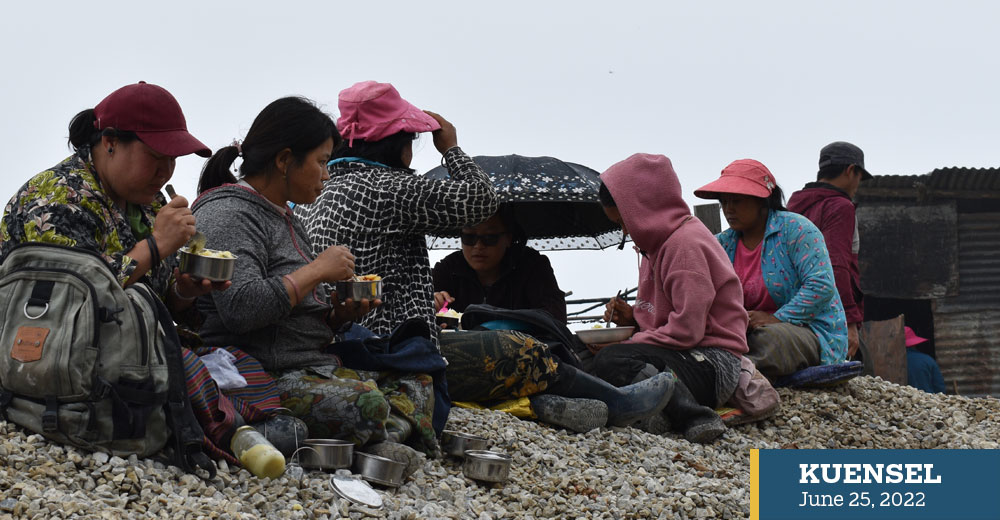Yangyel Lhaden
At Ngangshing, nineteen kilometres towards Samdrupjongkhar from Wamrong. It is early morning. The mountains are still very dark and dense.
The day before, a heavy rain had wreaked havoc along the highway. Vehicles are stranded; from both ends, there is a long line of vehicles. And many are joining the line from night-halt in Wamrong. The queue is growing by the hour.
There is a group of women walking along the roads. They are taking it easy. There are multiple blocks along the road; it is not their responsibility to clear them all.
Gaily one walks in to announce her wish. “The longer it takes to clear the road [from the other side], we have some respite to enjoy. These are Bhutanese women keeping the highways clear and clean. One can easily strike a conversation with these women, but who are they, really?
The women are working with Project DANTAK. When Indian workers left home in the wake of the Covid-19 pandemic, the country faced a serious shortage of worker. For many in the villages along the highway, there was a new opportunity.
There are about 20 road workers between Ngangshing and Narphung. If the block is cleared before lunchtime, their task for the day is to remove rocks on road, clear the drain, mix cement and help with the construction of wall, and also trim the grass along road above Narphung—pretty light going by their daily experience.
Chogyal Wangmo, a mother of four, got in touch with Project DANTAK and landed a job. “When there is job opportunity hitting at the door, why not take it? For us, in the villages, it’s a big thing.”
All the women working on road have similar stories to share—they want extra income to support their family and children’s education. Many come from disadvantaged family backgrounds.
Chogyal Wangmo said that with cost of living getting expensive by the day, her husband’s lone income was not enough to support her family. “My children are aware of what I go through every day. They tell me not to work, but that does not help. I want my children to rub shoulders with their mates and do well.”
Chimi Wangmo, 23, is a mother of a five-year-old girl. Her husband died two years ago. She wakes up at 5:30am every morning and drops her daughter to community Early Childhood Care and Development (ECCD) centre. And then she reports to work. By then, it is already at 7:00am.
Her daughter is the first to arrive in ECCD and last to leave.
Chimi Wangmo said that the instructors in ECCD have been taking care of her daughter. She is grateful.
Chimi Wangmo started working with Project DANTAK two years ago. She had to leave for Drametse, Mongar to perform rituals for her late husband. Without better options, she has returned. “I came back to work here because I had debt to clear.” Her alcoholic husband left her and the child with a heavy load debt to clear.
Now Chimi, being the eldest sibling, has to educate her brothers and sisters. She was not a bad student herself and wanted to become a doctor.
Another roadside worker, Sonam Zangmo, said that the pay is not all that bad. “ If we work regularly, we earn Nu 14,000 a month.” She earns around Nu 9,000 a month.
Nidup Zangmo would not have any source of income had she not decided to work under Project DANTAK. The sole provider in the family, she takes care of her ageing father and school-going daughter.
A single mother of an 11-year-old girl, Nidup used to work in Coca-Cola factory in Phuntsholing. She did not return back to Phuntsholing after she found a job with Project DANTAK. Her husband was a driver who passed away when she was four month pregnant. She used to live with her uncle in Phuntsholing and financially supported her daughter who lives in Ngangshing with her parents. “ My mother passed away two years ago and my father is also getting old. I had to stay back.”
The women here, along the highway, say that although they were satisfied with their work they are looked down upon. “What they think of us doesn’t matter. Probably we would think the same if they were in our shoes. It’s hard work we are doing to keep the roads open and we are proud of our ourselves.”
Nidup, the brightest of the group and the most vocal, said schemes like provided fund would be of great value for the roadside workers like her. “It is only because of pandemic we are recruited by Project DANTAK. Social security is important. Having that, we would not be talking about shortage of manpower in any sector.”
Past 11:45am, there is sign of the blocks getting cleared. The women sit on a pile of pebbles and open their packed lunch. However, happiness such as this moment is short-lived. Barely have they unfolded their simple ema datshi when news comes that there is clearing work to do.
The women climb on the back of a tripper truck and head towards Narphung.


